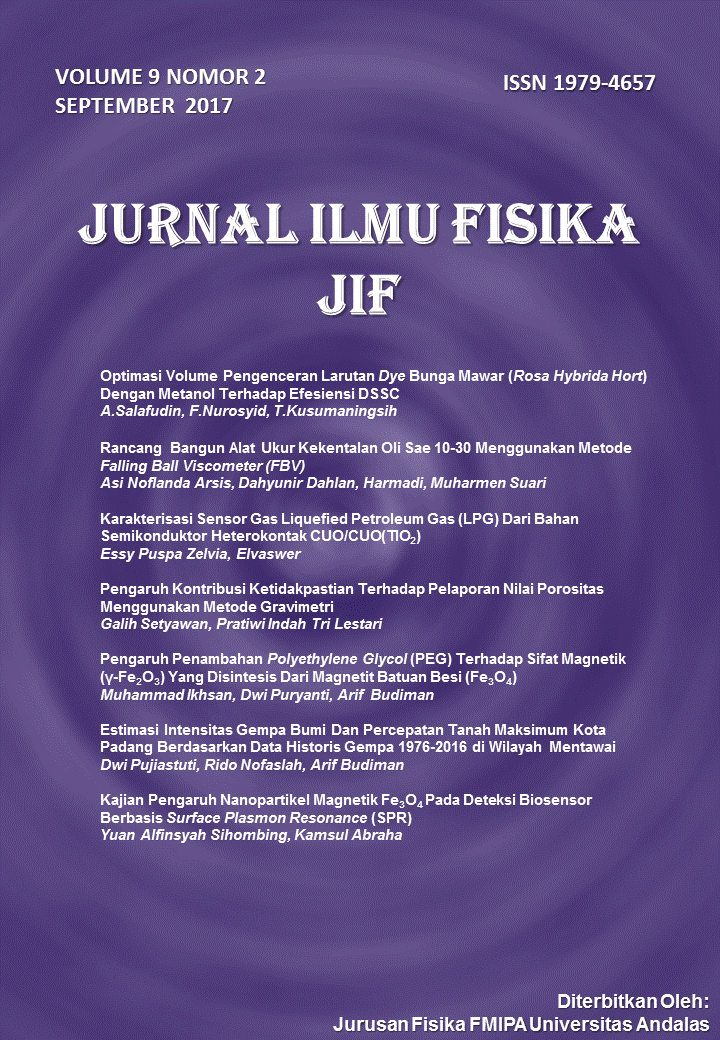Karakterisasi Sensor Gas Liquefied Petroleum Gas (LPG) Dari Bahan Semikonduktor Heterokontak CUO/CUO(TIO2)
DOI:
https://doi.org/10.25077/jif.9.2.87-96.2017Abstract
Telah dilakukan karakterisasi sensor Liquefied Petroleum Gas (LPG) berupa pelet heterokontak dengan lapisan pertama pelet adalah 100% mol CuO dan lapisan kedua pelet adalah CuO yang dicampur 10% mol, 20% mol, 30% mol, 40% mol dan 50% mol TiO2. Tahap pembuatan sensor LPG terdiri atas pencampuran bahan, kalsinasi pada temperatur 500oC selama 4 jam, penggerusan, kompaksi, dan sintering pada temperatur 700oC selama 4 jam. Sensor LPG diuji pada temperatur ruang (27oC) dengan melihat karakteristik arus dan tegangan (I-V), nilai sensitivitas, nilai konduktivitas dan karakterisasi XRD. Karakteristik I-V menunjukkan perubahan terbesar terjadi pada sampel CuO/CuO(20% mol TiO2). Nilai sensitivitas tertinggi dimiliki sampel CuO/CuO(20% mol TiO2) sebesar 11,94 pada tegangan 10 volt, dan merupakan sampel yang paling bagus digunakan sebagai sensor gas LPG. Nilai konduktivitas tertinggi dimiliki sampel CuO/CuO(10% mol TiO2) dengan nilai konduktivitas di udara sebesar 6,60557x10-5 Ω-1m-1 dan nilai konduktivitas di LPG 25,80712x10-5 Ω-1m-1.
Â
Kata kunci : heterokontak, sensor LPG, CuO/CuO(TiO2), karakterisasi I-V, sensitivitas, konduktivitas.
Downloads
Downloads
Published
How to Cite
Issue
Section
Citation Check
License
Please find the rights and licenses in JIF (Jurnal Ilmu Fisika).
1. License
The non-commercial use of the article will be governed by the Creative Commons Attribution license as currently displayed on Creative Commons Attribution-NonCommercial 4.0 International License.
2. Author's Warranties
The author warrants that the article is original, written by stated author(s), has not been published before, contains no unlawful statements, does not infringe the rights of others, is subject to copyright that is vested exclusively in the author and free of any third party rights, and that any necessary written permissions to quote from other sources have been obtained by the author(s).
3. User Rights
JIF's spirit is to disseminate articles published are as free as possible. Under the Creative Commons license, JIF permits users to copy, distribute, display, and perform the work for non-commercial purposes only. Users will also need to attribute authors and JIF on distributing works in the journal.
4. Rights of Authors
Authors retain the following rights:
- Copyright, and other proprietary rights relating to the article, such as patent rights,
- The right to use the substance of the article in future own works, including lectures and books,
- The right to reproduce the article for own purposes, provided the copies are not offered for sale,
- The right to self-archive the article.
5. Co-Authorship
If the article was jointly prepared by other authors, the signatory of this form warrants that he/she has been authorized by all co-authors to sign this agreement on their behalf, and agrees to inform his/her co-authors of the terms of this agreement.
6. Termination
This agreement can be terminated by the author or JIF upon two months's notice where the other party has materially breached this agreement and failed to remedy such breach within a month of being given the terminating party's notice requesting such breach to be remedied. No breach or violation of this agreement will cause this agreement or any license granted in it to terminate automatically or affect the definition of JIF.
7. Royalties
This agreement entitles the author to no royalties or other fees. To such extent as legally permissible, the author waives his or her right to collect royalties relative to the article in respect of any use of the article by JIF or its sublicensee.
8. Miscellaneous
JIF will publish the article (or have it published) in the journal if the article's editorial process is successfully completed and JIF or its sublicensee has become obligated to have the article published. JIF may conform the article to a style of punctuation, spelling, capitalization, referencing and usage that it deems appropriate. The author acknowledges that the article may be published so that it will be publicly accessible and such access will be free of charge for the readers.



